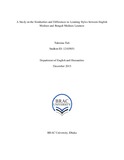| dc.contributor.advisor | Anwar, Nafisa | |
| dc.contributor.author | Malek, Md. Abdul | |
| dc.date.accessioned | 2024-06-26T07:43:58Z | |
| dc.date.available | 2024-06-26T07:43:58Z | |
| dc.date.copyright | ©2023 | |
| dc.date.issued | 2023-04 | |
| dc.identifier.other | ID 18357029 | |
| dc.identifier.uri | http://hdl.handle.net/10361/23607 | |
| dc.description | This thesis is submitted in partial fulfillment of the requirements for the degree of Master of Education degree in Educational Leadership and School Improvement, 2023. | en_US |
| dc.description | Cataloged from PDF version of thesis. | |
| dc.description | Includes bibliographical references (pages 54-71). | |
| dc.description.abstract | The demand for teachers' professional development has shifted towards e-learning platforms due to their flexibility, convenience, and cost-effectiveness, especially during and after the COVID-19 pandemic. With the rise in accessibility and availability of e-learning platforms in urban areas, the role of these platforms in the professional development of urban primary school teachers has become increasingly important. This qualitative research investigated the opportunities and challenges of using e-learning platforms for the professional development of urban primary school teachers in Bangladesh. The research questions focused on how teachers use e-learning platforms for their professional development and the problems they face when using them. The study used convenience-sampled participants for interviews and focus group discussions and analyzed the data thematically. The study explored that e-learning platforms help teachers learn new skills and share knowledge. The online learning environments further foster collaboration and community, allowing them to share their professional identities. Teachers have greatly benefited from using e-learning platforms in their professional fields and implementing the learned knowledge in the classroom. However, some major challenges in using e-learning platforms include network issues, lack of compatible devices, technological incompetence of the users, excessive workload, and lack of recognition from e-learning platforms. This study suggests that providing teachers’ training on the applications of e-learning platforms and acknowledging e-learning certificates can positively enhance teachers' motivation levels. Additionally, creating user-friendly and accessible e-learning systems with increased government support and attention is also recommended. | en_US |
| dc.description.statementofresponsibility | Md. Abdul Malek | |
| dc.format.extent | 88 pages | |
| dc.language.iso | en | en_US |
| dc.publisher | Brac University | en_US |
| dc.rights | BRAC University theses are protected by copyright. They may be viewed from this source for any purpose, but reproduction or distribution in any format is prohibited without written permission. | |
| dc.subject | Teachers’ Professional Development (TPD) | en_US |
| dc.subject | E-learning | en_US |
| dc.subject | Learning platforms | en_US |
| dc.subject | Online learning | en_US |
| dc.subject | Learning environment | en_US |
| dc.subject | Urban teachers | en_US |
| dc.subject | COVID-19 | |
| dc.subject.lcsh | Teachers--In-service training--Bangladesh | |
| dc.subject.lcsh | Internet in education | |
| dc.subject.lcsh | Education, Primary | |
| dc.subject.lcsh | Distance education | |
| dc.title | Role of the current E-learning platforms in urban primary teachers’ professional development: opportunities and challenges | en_US |
| dc.type | Thesis | en_US |
| dc.contributor.department | Institute of Education Development, BRAC University | |
| dc.description.degree | M.Educational Leadership and School Improvement | |




